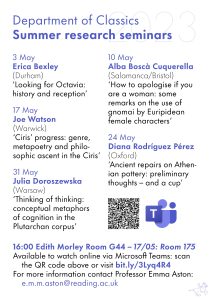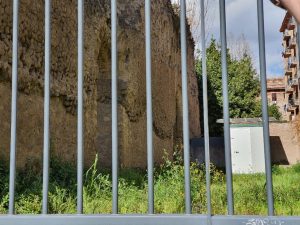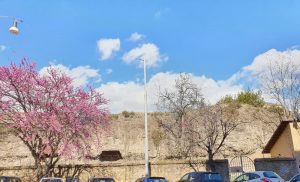The following blog has been written by Jackie Baines, who organised a workshop on ‘Developments in Ancient Language Pedagogy’ held in the Department on Friday 19th May 2023. We would like to thank Jackie and all those involved for running such a successful event!
On the 19th May I ran an international blended workshop on the topic of advances in ancient language pedagogy. The workshop came about as part of my research leave which, as a teaching intensive lecturer, has given me the opportunity to look at ways in which I might refresh my pedagogical ideas and practices. I am indebted to Edward Ross who assisted me with many aspects of the organisation of this event. The rationale for the workshop and the choice of talks and speakers came about as a result of experiences and observations over a number of years teaching Latin here at the University of Reading, which include the following:
Choice of Textbooks
For many years we used Jones and Sidwell Reading Latin as the main textbook with all its quirks and difficulties for complete beginners. After looking at the suitability of many possible alternatives we subsequently moved to using Taylor’s Latin to GCSE which is very much more approachable in its presentation of grammar and its layout for 21st century students but has many drawbacks for moving on with speed and full understanding, to higher levels of Latin.
Teaching Spoken Latin
This academic year (2022 – 2023) I am grateful to my colleague Professor Eleanor Dickey who organised weekly sessions of spoken Latin for colleagues, run by teachers from Oxford Latinitas. It was a revelation in a number of ways, principally, that there are definite advantages to learning to use a language, now considered ‘dead’ by many, as languages are normally used – that is to speak. Latin was indeed taught orally until relatively recently, so why aren’t we doing more of it? A subsidiary lesson for me was being returned to the position of student, at times most alarming and stressful when using a language I know well, but in a totally unfamiliar way. I have set up a student focus group using Ørberg’s Lingua Latina per se Illustrata. I am impressed by the speed of vocabulary acquisition and grammatical understanding gained by reading and speaking using only (mostly!) Latin.
Online learning in the post-pandemic world
The pandemic has made us realise the possibilities of online tools for additional learning support. The rise of AI, in particular Chat GPT is opening up a myriad of opportunities and unnerving problems, both for teachers and for the students themselves who need to have enough understanding to use such tools appropriately. Edward A.S. Ross has recently published an article discussing this further here. Edward and I are delighted to be able to announce that since the workshop we have been awarded Teaching and Learning Enhancement Projects funding by the University of Reading to investigate and trial ChatGPT as a conversational language study tool by codifying and standardising methods for using conversational Artificial Intelligence (AI) models in ancient language classes.
Workshop talks
In the workshop we were treated to six stimulating and thought-provoking talks, listed below with abstracts available here. Speakers reflected on past practices and perceptions of ancient languages and how they have been taught along with learning how the emergence of new technologies and their use can be used to enhance our teaching. Thanks to all speakers for their contributions.
Emergent pedagogies in classical languages teaching in UK schools: Steven Hunt (University of Cambridge)
Capturing the Classroom: A Snapshot of Approaches to Latin Teaching in UK Universities: Mair E. Lloyd (Open University and University of Cambridge); James Robson (Open University)
Using Simple Grammar Videos to Flip the Classroom: Antonia Ruppel (Institute of Indology and Tibetology, LMU Munich)
Digital software as a pedagogical aid in teaching ancient Egyptian hieroglyphs: Maiken Mosleth King (University of Bristol)
A New Frontier: AI and Ancient Language Pedagogy: Edward A. S. Ross (University of Reading)
Living Latin in the Classroom: benefits and challenges of communicative approaches: Mair E. Lloyd (Open University and University of Cambridge)
Written by Jackie Baines



















